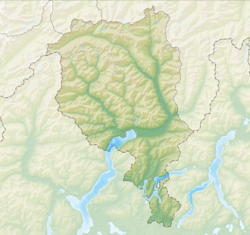Bidogno facts for kids
Quick facts for kids
Bidogno
|
||
|---|---|---|
|
||
| Country | Switzerland | |
| Canton | Ticino | |
| District | Lugano | |
| Area | ||
| • Total | 3.48 km2 (1.34 sq mi) | |
| Elevation | 790 m (2,590 ft) | |
| Population | ||
| • Total | 328 | |
| • Density | 94.25/km2 (244.1/sq mi) | |
| Postal code |
6958
|
|
| Surrounded by | Capriasca, Corticiasca, Sonvico, Valcolla | |
Bidogno was once a small town, also known as a 'municipality,' located in the beautiful country of Switzerland. It was part of the Lugano district in the canton of Ticino. Think of a municipality as a local government area. Bidogno used to be its own independent town, but it later joined with other nearby towns to form a larger area.
Contents
What is Bidogno?
Bidogno is a former municipality in Switzerland. This means it used to be an independent town with its own local government. However, it no longer exists as a separate municipality. On April 20, 2008, Bidogno became part of the new municipality called Capriasca. This often happens when smaller towns combine to create a larger, more efficient community.
Where is Bidogno located?
Bidogno is found in the Ticino canton, which is the southernmost part of Switzerland. This canton is known for its Italian-speaking culture and stunning Alpine landscapes. Bidogno is specifically located in the Lugano district. It sits at an elevation of about 790 meters (2,592 feet) above sea level. This means it's quite high up in the mountains!
How big was Bidogno?
The area of Bidogno was about 3.48 square kilometers (1.34 square miles). To give you an idea, that's roughly the size of a small park or a few hundred football fields. In December 2004, Bidogno had a population of 328 people. This shows it was a small, close-knit community.
What did Bidogno's coat of arms look like?
A coat of arms is like a special symbol or emblem for a town, family, or organization. It often tells a story about its history or features. Bidogno's coat of arms was quite interesting. It had a red background. On this background, there was a black male goat walking. Below the goat, there were two ears of oat growing from the bottom. This design likely represented something important to the people or the land of Bidogno.
 | Jewel Prestage |
 | Ella Baker |
 | Fannie Lou Hamer |




